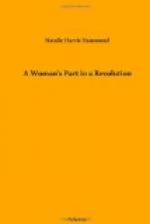As is usual, the passengers’ names had been telegraphed ahead, and a crowd of Boers had gathered at the station to see the man who had come back to get his sentence. They were a wild, uncouth-looking crowd from the adjacent farms. I could hear them ask, ‘Where is he?’ ’In there,’ another would answer, pointing with his thumb over his shoulder to our compartment. In threes and fours they would shuffle into our car and gaze with dull, stupid curiosity upon the prostrate man, as sheep gaze at a dead member of the flock. Dr. Scholtz, keen-eyed and watchful, stood on guard in the doorway. Platinum would have melted under the courteous warmth of his manner to the officials.
Our train at last under way, I found some one had thrust a bunch of fresh grapes into my little boy’s hand.
Nearing Johannesburg Dr. Scholtz came to me: ’Your husband is exhausted. I think it best for him to pass the night at his home, going to Pretoria on the mid-day train to-morrow.’
It was well we did this, for between Johannesburg and Pretoria this train met with one of the collisions so frequent on the Netherlands Railway. Only the engineer and a brakeman were killed, but the shock would certainly have been most disastrous to us.
SUNDAY, NOON, APRIL 26.—My husband with Dr. Scholtz started for Pretoria. I was unable to leave my bed, but it was agreed that Betty and I should follow on the early train of the morrow.
The Reform trial which was begun on Friday, April 24, was resumed on Monday.
Repeated wires from Mr. Hammond and Dr. Scholtz prevailed upon me to remain at my home to rest another day. ’It would probably be a long trial.’
X
My husband reached Pretoria Sunday evening, April 26. The information that we had received en route, regarding the pleas of guilty entered by the imprisoned Reformers, was confirmed by his associates: the other three leaders, Messrs. Rhodes, Farrar, and Phillips, had entered a plea of guilty under count one of the indictment for high treason, the fifty-nine Reformers entering a like plea of guilty under the count of lese-majeste. As conjectured by us when we heard of this action of the Reformers, the prisoners had received certain assurances before making such pleas:
First.—That they should not be tried under the comparatively obsolete Roman Dutch Law, which punished the crime of treason with death; but they would be tried and punished under, and in accordance with, the code laws of the Transvaal Republic, which imposed penalties of fine and imprisonment for the crime charged in the indictment.
Second.—The leaders were further assured that this action on their part would measurably mitigate the sentences of the other fifty-nine Reformers.
On Monday, the 27th, the Court reconvened in the market hall, the imported Judge Gregorowsky occupying the bench.




